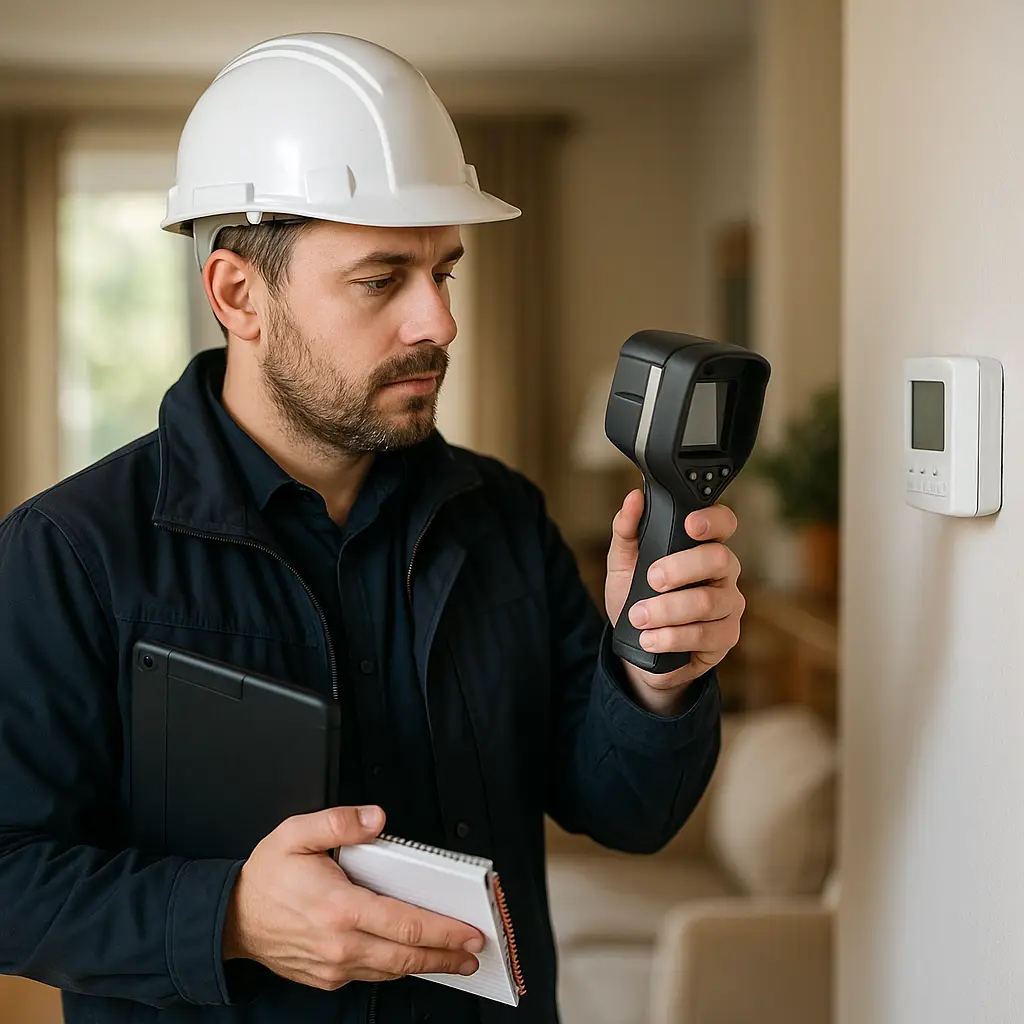Why a Home Energy Assessment Matters
Every home in the UK uses energy, and some use more than necessary. Most of us don’t realise how much heat is lost through our windows, doors, walls and even through our loft. Heating our homes can often become costly, especially if energy is wasted due to hidden problems like poor insulation or draughts. A home energy assessment helps us uncover these issues.
When we book one, a trained assessor visits the property and checks how our home uses energy. They look at things like heating systems, insulation, windows, and even how we use lighting. The goal is to find ways to reduce energy use and improve our home’s energy rating.
At Ratio Seven, we help people book and carry out these assessments in a straightforward way. If you’re curious about energy ratings or worried about rising bills, this might be your first step towards making your home more energy-friendly.
What is an Energy Performance Certificate?
You’ve probably heard of an EPC, or Energy Performance Certificate. These certificates are required when you rent, sell or build a home in the UK. The EPC gives your home a rating from A to G. An ‘A’ rating means the property is very energy smart, while a ‘G’ rating means it’s not doing so well.
A home energy assessment is the step that comes before an EPC. It’s how we find out what rating your home currently has and how it can be made better. You don’t need to be moving house to get one. Many people now book assessments just to get advice on saving money or reducing their home’s impact on the environment.
The better your energy rating, the more attractive your home becomes if you’re thinking of selling or renting it out. It also means you spend less on heating and electricity bills.
What Happens During a Home Energy Assessment?
During a home energy assessment, a qualified assessor needs to visit the property. They’ll usually spend around one to two hours with you, depending on the size of your home. They’ll take measurements, look at your heating system, and ask questions about how you use the space.
They may climb into the loft to check insulation, look at how your walls are built (solid or cavity walls), and possibly use special tools to find draughty areas or cold spots. We don’t need to do anything special to prepare, except make sure the assessor can have access to all rooms, the heating controls and the boiler.
At Ratio Seven, we keep things simple. After the visit, you get a report showing how your home currently uses energy and how you could make changes for the better. Changes might be simple, like sealing draughts or adding energy-saving light bulbs. Bigger steps might be adding insulation or upgrading the boiler.
If you’re ready to learn more, you can book your own home energy assessment today.
Simple Improvements That Make a Big Difference
One of the biggest benefits of an energy assessment is spotting low-cost improvements that could save us hundreds of pounds each year. Sealing draughty doors, adding loft insulation or switching to LED lighting might seem small, but they stack up.
Here are some popular changes people choose after an assessment:
- Loft and wall insulation
- Draught-proofing windows and exterior doors
- Replacing old boilers with new, energy-saving models
- Fitting smart thermostats
- Using thicker curtains to keep heat in
- Switching to low-energy bulbs
Each home is different, and an energy assessment gives specific advice that fits your own situation.
How It Helps Property Owners, Landlords and Tenants
Whether you’re a homeowner, landlord or even a tenant, a home energy assessment has value. For homeowners, it means lower bills and a more comfortable living space. Some find that simple upgrades even stop cold spots and damp in the walls.
Landlords can use the energy rating to meet rental laws. Since 2020, all rental homes in the UK have needed an EPC rating of E or better. If the rating is lower, you can’t legally rent the property. An energy assessment helps spot the problems before they end up causing trouble.
For tenants, even if you don’t own the property, a better energy rating means warmer winters and cheaper heating.
You can always get in touch with Ratio Seven directly if you want to ask about how this fits your situation.

When is the Best Time to Book an Assessment?
The best time to book a home energy assessment is now. It’s not only helpful in winter, although cold weather often makes you notice poor insulation or older heating systems. The sooner we know what energy we’re wasting, the sooner we can stop it.
Spring and summer assessments are great too because they give us time to make changes before the next winter hits. Some improvements, like loft or wall insulation, might require a short booking time, so planning early is always smart.
If you’re about to sell your home or put it on the rental market, booking an assessment now could help speed up the process and avoid legal problems.
You can learn more about what’s involved through the Home Energy section on our website.
What You Need to Know About Costs
Many people worry that a home energy assessment will be expensive. In truth, they are affordable, especially when you think about the money you could save on future bills.
At Ratio Seven, we keep the process straightforward. You can contact us with your postcode and type of property, and we’ll provide a clear cost upfront. There are no surprise fees.
We always recommend comparing the cost of the assessment with your average heating bill. If you’re spending hundreds each winter, small upgrades could save quite a chunk of that.
In some cases, there may even be grants available for certain improvements. For instance, if your house has solid walls and you qualify for government funding, you could be helped with insulation costs.
Common Questions About Home Energy Assessments
Do I need to leave the house during the assessment?
No, you can stay home. It’s helpful if you’re there to answer questions about how the heating and appliances are used.
Is the assessment noisy or messy?
Not at all. Assessors use cameras, thermal tools and tape measures. There is no drilling or damage done.
How long does it take?
Usually between one and two hours, depending on the size and layout of your home.
Is it just for old homes?
No. New homes can also have poor energy performance if built without good insulation or smart heating controls.
Will I get a certificate?
If requested, we can issue a new EPC. Otherwise, you’ll receive a full report suggesting improvements.
Can I get one done if I’m a tenant?
Yes, but you’ll need permission from your landlord if it involves changes to the building.
If you’d like to ask more questions or book directly, visit our contact page.
Find Out Where Your Home’s Losing Heat – And What to Do About It
Ready to make your home warmer and your energy bills smaller? A home energy assessment is a smart first step. It’s quick, can save you money, and helps you understand exactly how your home uses and sometimes wastes energy.
At Ratio Seven, we provide professional advice and fast bookings. If you’re unsure where to start, visit our Home Energy page or call us for a no-obligation chat.
Don’t keep paying for energy you don’t use. Get in touch with Ratio Seven and start making your home work better for you today.




